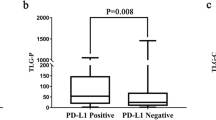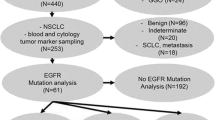Abstract
MUC1 expression has been described as a predictor for tumor progression and worsening of prognosis in various human neoplasms. However, little is known about the role of MUC1 expression in pulmonary metastatic tumors. The aim of this study is to examine the clinicopathological significance of MUC1 expression in pulmonary metastatic tumors (PMT). One hundred forty-seven patients with PMT who underwent 18F-FDG PET before metastasectomy were included in this study. Tumor sections were stained by immunohistochemistry for MUC1, glucose transporter 1 (Glut1), hypoxia-inducible-1α (HIF-1α) and vascular endothelial growth factor (VEGF). 18F-FDG uptake and the expression of these biomarkers were correlated in primary lung cancer. MUC1 expression pattern was classified into high-grade polarized expression (HP), low-grade polarized expression (LP), or depolarized expression (DP) group. Of 147 patients, HP, LP and DP group were 9 (6%), 114 (78%) and 24 (16%), respectively. The expression of Glut1, HIF-1αand VEGF, and 18F-FDG uptake were significantly higher in DP group than HP or LP groups. MUC1 expression with HP and DP pattern was significantly higher in primary lung cancer than in PMT, whereas, MUC1 expression with LP pattern yielded a significantly high positive rate in PMT. LP group was recognized in the majority of patients with pulmonary metastatic adenocarcinoma, especially colon cancer, whereas, HP group was significantly low in pulmonary metastatic adenocarcinoma as compared with primary adenocarcinoma. Polarized MUC1 has a different expression pattern between primary and metastatic tumors with adenocarcinoma, and depolarized MUC1 is closely associated with glucose metabolism and hypoxia.




Similar content being viewed by others
References
Gendler SJ, Lancaster CA, Taylor-Papadimitriou J et al (1990) Molecular cloning and expression of human tumor-associated polymorphic epithelial mucin. J Biol Chem 265:15286–15293
Schroeder JA, Masril AA, Adriance MC et al (2004) MUC1 overexpression results in mammary gland tumorigenesis and prolonged alveolar differentiation. Oncogene 23:5739–5747
Nagai S, Takenaka K, Sonobe M et al (2006) A novel classification of MUC1 expression is correlated with tumor differentiation and postoperative prognosis in non-small cell lung cancer. J Thorac Oncol 1:46–51
Woenckhaus M, Merk J, Stoehr R et al (2008) Prognostic value of FHIT, CTNNB1, and MUC1 expression in non-small cell lung cancer. Hum Pathol 39:126–136
Utsunomiya T, Yonezawa S, Sakamoto H et al (1998) Expression of MUC1 and MUC2 mucins in gastric carcinomas: its relationship with the prognosis of the patients. Clin Cancer Res 4:2605–2614
Hinoda Y, Ikematsu Y, Horinouchi M et al (2003) Increased expression of MUC1 in advanced pancreatic cancer. J Gastroenterol 38:1162–1166
Tamada S, Goto M, Nomoto M et al (2002) Expression of MUC1 and MUC2 mucins in extrahepatic bile duct carcinomas: its relationship with tumor progression and prognosis. Pathol Int 52:713–723
Kawamoto T, Shoda J, Miyahara N et al (2004) Expression of MUC1 recognized by a monoclonal antibody MY. 1E12 is a useful biomarker for tumor aggressiveness of carcinoma of the gallbladder. Clin Exp Metastasis 21:353–362
Feng H, Ghazizadeh M, Konishi H et al (2002) Expression of MUC1 and MUC2 mucin gene products in human ovarian carcinomas. Jpn J Clin Oncol 32:525–529
Sivridis E, Giatromanolaki A, Koukourakis MI et al (2002) Patterns of episialin/MUC1 expression in endometrial carcinomas and prognostic relevance. Histopathology 40:92–100
Baldus SE, Monig SP, Huxel S et al (2004) MUC1 and nuclear beta-catenin are coexpressed at the invasion front of colorectal carcinomas and are both correlated with tumor prognosis. Clin Cancer Res 10:2790–2796
Kirschenbaum A, Itzkowitz SH, Wang JP et al (1999) MUC1 expression in prostate carcinoma: correlation with grade and stage. Mol Urol 3:163–168
Broadbent R, Thynne G, McKenzie IFC (1997) Antibody and T cell responses of patients with adenocarcinoma immunized with mannan-MUC1 fusion protein. J Clin Invest 100:2783–2792
Hirasawa Y, Kohno N, Yokoyama A et al (2000) Natural antoantobody to MUC1 is a prognostic indicator for non-small cell lung cancer. Am J Respir Crit Care Med 16:589–594
Giatromanolaki A, Koukourakis MI, Sivridis E et al (2000) Coexpression of MUC1 glycoprotein with multiple angiogenic factors in non-small cell lung cancer suggests coactivation of angiogenic and migration pathways. Clin Cancer Res 6:1917–1921
Situ D, Wang J, Ma Y, et al (2010) Expression and prognostic relevance of MUC1 in stage IB non-small cell lung cancer. Med Oncol Nov 30 [Epub ahead of print]
Kaira K, Okumura T, Ohde Y et al (2011) Correlation between 18F-FDG uptake on PET and molecular biology in metastatic pulmonary tumors. J Nucl Med 52:705–711
Kaira K, Endo M, Abe M et al (2010) Biologic correlation of 2-[18F]-fluoro-2-deoxy-D-glucose uptake on positron emission tomography in thymic epithelial tumors. J Clin Oncol 28:3746–3753
Mikami Y, Hisatsune A, Tashiro T et al (2009) Hypoxia enhances MUC1 expression in a lung adenocarcinoma cell line. Biochem Biophys Res Commun 379:1060–1065
Aubert S, Fauquette V, Hémon B et al (2009) MUC1, a new hypoxia inducible factor target gene, is an actor in clear renal cell carcinoma tumor progression. Cancer Res 69:5707–5715
Kontani K, Taguchi O, Ozaki Y et al (2003) Dendritic cell vaccine immunotherapy of cancer targeting MUC1 mucins. Int J Mol Med 12:493–502
Kufe DW (2009) Functional targeting of MUC1 oncogene in human cancers. Cancer Biol Ther 8:1197–1203
Conflicts of Interest Statement
We, all authors, have no financial or personal relationships with other people or organizations that could inappropriately influence our work.
Author information
Authors and Affiliations
Corresponding author
Rights and permissions
About this article
Cite this article
Kaira, K., Okumura, T., Nakagawa, K. et al. MUC1 Expression in Pulmonary Metastatic Tumors: A Comparison of Primary Lung Cancer. Pathol. Oncol. Res. 18, 439–447 (2012). https://doi.org/10.1007/s12253-011-9465-9
Received:
Accepted:
Published:
Issue Date:
DOI: https://doi.org/10.1007/s12253-011-9465-9




